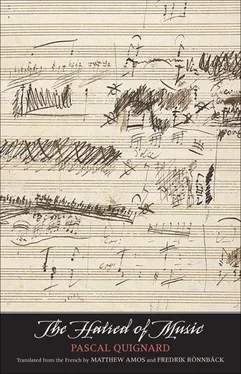Le jour est desja grand et la honte plus claire
De l’apostre ennuyé l’avertit de se taire
Sa parole se lasse et le quitte au besoin
Il voit de tous costez qu’il n’est veu de personne .
Toutesfois le remors que son ame luy donne
Tesmoigne assez le mal qui n’a point de témoin . 17

Abandoning that which abandons. Abandoning those who abandon. Chaste shame, twilit shame in the suffering of love, shame that precedes the embrace in the night, shame that prefers shadow and remorse, relics, songs, tears, crêpe, veils, the color black — this movement was once called mourning. The French word for mourning, deuil , comes from the Latin word for pain. The Latin dolor comes from being beaten. The forceful expression for having a migraine was, in ancient Rome, caput mihi dolet (my head is beating). It is the beating of the blood; the pulse is the beat of music. Beating that defines the tarabust , since it precedes pulmonation. Migraines are the pensive drumming of a small expression or a small memory that begins to tarabust the breath (the psychè ) of those who as a result begin to breathe with more and more difficulty. One must search for the name of the victim whose skin was stretched across this small psychic drum in order for this constriction of the skull to find the means to relax at last. For the heart of the tarabust, the dregs of the amphora, is obstruction, even before asphyxia. It is death, unmourned death, man’s irrepressible nocturnal death wish. What returns in the form of migraines also returns in the form of nightmares. The dead betray us, by abandoning us, and we never cease to betray the dead, by living. We are angry with the dead not only for their death, but for death itself, of which they are proof, not least through the pain of the blood within us that beats for two. “Why have you forsaken me?” Deus meus, Deus meus, ut quid dereliquisti me? Even gods scream this scream toward death. Derelictio , abandonment, such is the “scream of mourning,” the dolor . This scream is older than the first century of our era and older than Friday, April 7, 30. Such is the scream that Peter too lets out, after Jesus has emitted it, when he feels his own denial under the porch of the atrium of Caiaphas’s father-in-law in Jerusalem. He has just forsaken the one who has just forsaken him. A courtyard song, a childhood song, a song that comes from farther away than the knowledge of that which devotes to death, a song that comes from farther away than the acquisition of language, a song that is a relic, an archaic song that is distance in time become perceptible as a hoarse sound, daybreak lodged in the throat of a strangely anachronistic fowl:
Il a la voix perçante et rude;
Sur la tête un morceau de chair;
Une sorte de bras dont il s’élève en l’air … 18
By this sound, Simon shivers under the rock of his second name, trembles under the stony shell, sobs on the stone porch. It is not only God he has denied; he has denied himself; he has forsaken himself by forsaking the nets at Capernaum, by giving up the boat on the banks of the Jordan; it is both the horror and the daimōn itself that is joined to it, and that he has denied in the past, that are suddenly startled together.
He forsook himself by forsaking his name.
The cock’s crow ringing so curiously in Peter’s ear is the rock to which God has devoted him, the ceaselessly uneven cobblestone that always dates back to before man’s mastery of language, the porch of music, the threshold of music, and that afterward assumes the form of tears: when sounds were pure passions, tragic, suffocating, disconcerting, frightening passions. Acoustic daybreaks, and not linguistic signs. The innate pathos returns, the acoustic night, the pricked ear in the acoustic night, in the acoustic forest, in the nocturnal cave where humans advanced with torches and lamps filled with fat at the breaking of initiation, upon their death-and-rebirth in the nocturnal depths of the earth. It is the terror before the body itself, all of a sudden abandoned to rhythms and screams, between the open legs of a mother, on the bank of a thigh, in a sand of filth, in a lake of urine, in the air where these sorts of fish suffocate — in a sort of acoustic Capernaum that continues without break until the ultimate wail in the expiration of death.

Curiously: music protects sounds. The first works of so-called Baroque music were inhabited by the will to tear oneself out of the acoustic bark by means of the modulations peculiar to human language and the organization of its affetti . The invention of opera resulted from this will for affective rebirth, for acoustic breaking and sorting, for acoustic sacrifice. I consider the highly tonal diatonic scale, from the early seventeenth century to the first half of the eighteenth century, in Europe, to be one of the most beautiful things ever to have existed, no matter how briefly. Of an absolute beauty — no matter how contingent and immediately deprived of a future. I rank it as highly as the Roman satura , the invention in Greece and in Rome of the historical genre, red wine from the Bordeaux region, a grilled fillet of Saint Peter’s fish, bourgeois individualism, William Shakespeare’s tragedies.

It is said that as Peter grew older he could no longer bear cocks. Even domesticated thrushes, small quail, pigeons, mallards, and blackbirds that frighten no man — all that could sing, in the courtyard of his basilican palace in Rome, he had put to death. Cneius Mammeius reports that he would ask Fuscia Caerellia to smother them in a cloth dyed with bilberries ( vaccinia ). This was before he was incarcerated in the Mamertine prison, that is, before Seneca the Younger was forced to commit suicide. Saint Peter (Simo Petrus) lived at the time in a vast, rather dilapidated, palace in Rome, acquired in the early 60s. He was beginning to become known. Simo Petrus dined with Lucan, with Seneca, with the young Spaniard Martial. He was also seen at Quintilian’s, at Valerius Flaccus’s, at Pliny’s. Cneius Mammeius says that in the last moments of his life he could no longer bear children at play or the songs of the Divine Office. One day, he had a group of elderly patrician women chased away with a whip, when they had just converted to the Christian party, because they lingered in the courtyard to gossip while letting out loud high-pitched screams. The palace was shrouded in silence, the windows blinded with drapes. The doors to the inner apartment were hung with several Gallic coats, attached with the help of a horizontal beam, stitched together in order to muffle sounds. Fuscia Caerellia made little wool plugs that hung day and night from Saint Peter’s ears.
Second Treatise. IT SO HAPPENS THAT EARS HAVE NO EYELIDS
All sound is the invisible in the form of a piercer of envelopes. Whether it be bodies, rooms, apartments, castles, fortified cities. Immaterial, it breaks all barriers. Sound ignores skin, does not know what a limit is: it is neither internal, nor external. Unlimiting, it is unlocalizable. It cannot be touched: it is ungraspable. Hearing is not like seeing. What is seen can be abolished by the eyelids, can be stopped by partitions or curtains, can be rendered immediately inaccessible by walls. What is heard knows neither eyelids, nor partitions, neither curtains, nor walls. Undelimitable, it is impossible to protect oneself from it. There is no acoustic viewpoint. There is no terrace, no window, no keep, no citadel, no panoramic lookout of sound. There is neither a subject nor an object of hearing. Sound rushes in. It violates. Hearing is the most archaic perception in the course of personal history, even before smelling, well before seeing, and it is allied with the night.
Читать дальше













